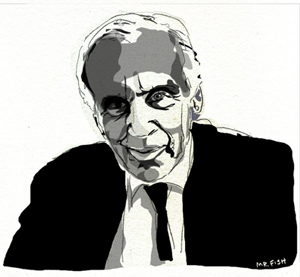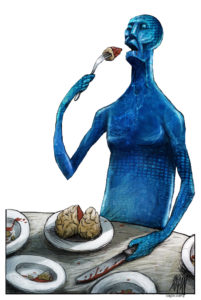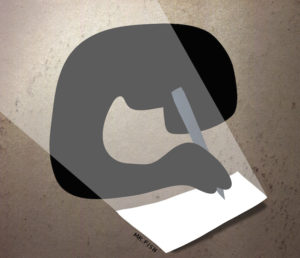June Gloom With Lewis Lapham
There is always smoke around Lewis Lapham, as if he’d just been conjured by some sorcerer suddenly enraged by the placation of the status quo.There is always smoke around Lewis Lapham, as if he’d just been conjured by some sorcerer.
There is always smoke around Lewis Lapham, as if he’d just been conjured by some sorcerer suddenly enraged by the placation of the status quo and alarmed by the myopia of contemporary culture and the rabid asininity of 21st century political discourse. The smoke, of course, is not supernatural, but rather comes from the Parliament Lights that Lapham has been smoking for decades. Like the man himself, who is never outside of the pressman’s dark suit and tie, they hark back to a time when professionalism was decidedly masculine-chic and personal freedoms, even unhealthy ones, trumped the bullying demands, even the healthy ones, of the dominant culture.
I began reading him as a teenager in 1984, while working at a drugstore after school in southern New Jersey. Harper’s Magazine, with Lapham as the newly reinstated editor, had just undergone a redesign and his monthly “Notebook” column, always constructed with the care and meticulous attention to detail usually associated with those working with either scalpels or explosives, was one of the things that made me want to grow up to become an insufferable and excessively well-read know-it-all. Contrary to his academic lineage, Lapham impressed me, and still does, as the most plainspoken public intellectual ever produced by the blue-blooded coupling of Yale and Cambridge, a feat deserving of real praise if only because similar Ivy League inbreeding has been known to produce great litters of erudite ninnies and putrid snobs.
Anyway, I recently came across an interview that I’d conducted with Lapham in 2008, just as the economic crisis was beginning to unfold its magnificent class-conscious talons and just before Barack Obama was swept triumphantly into the Oval Orifice. It was only months after the launch of his post-Harper’s publication, Lapham’s Quarterly, a themed literary journal that relies on the rigorous mining of world history, both ancient and present-day and everything in between, for its content. The conversation was supposed to be about the death of the mid-20th century counterculture and whether it had been homicide or suicide that’d killed it, and it was, or at least it started out that way, but the cacophony of current events eventually had the better of us and our talk quickly became early 21st century prophesying. We spoke for an hour and a half at Lapham’s then-new offices in lower Manhattan, the two of us sequestered inside a tiny glass room in the corner of a much larger office populated by editors and their editorial assistants. As if he were representative of a rare and nearly extinct bird, his office felt like an aquarium that had been designed to allow the Lewis-icus laphamogatus to live out its final years in an environment best suited to its comfort and joy, meaning that the great tar and nicotine aroma that hung in the air like silt was being churned continuously by a refrigerator-sized air conditioner that roared like a riding mower and cooled the room with all the efficiency of a half-eaten popsicle that is waved through the air.
That said, what follows is a sampling of what we talked about that June afternoon, his voice as clear as a bell on the recording, mine compromised somewhat by General Electric and the helicopter gunship that the good general rode through my entire transcription. Luckily, the notes that I took during my discussion with Lapham, plus the questions that I prepared before our meeting, were able to fill in where necessary.
Fish: Assuming that you recognize the same shift in the American culture that I do, namely that members of the artistic community — specifically those writers and philosophers and painters and poets most committed to exploring the perplexing and fascinating vagaries of our human identity — are no longer encouraged to participate in the national debate about who we are as a nation and what our responsibilities might be to our own moral and humanitarian ideals, all political avocations be damned. In other words, where are the modern day Picassos and Voltaires and Mailers and Twains?
Lapham: I think that what’s happened is that we have a new language. My answer comes out of Marshall McLuhan — McLuhan publishes “Understanding Media” in 1964 and makes the point that we shape our tools and our tools shape us and he sees the shift from print to the electronic media as a revolution in the settled political aesthetic order. Now his observations from 1964 have simply become more and more apparent and seemingly more prescient as time has gone by. He recognized that television is not a medium that lends itself to philosophy, literature or even straightforward narrative.
Fish: Nor does it provide a stopping point for contemplation, which is the only way [that people have] of deepening their understanding of things.
Lapham: Right — with the electronic media there is no memory, it’s always the eternal present, which is constantly dissolving and contributing to a great social anxiety.
Fish: The electronic media has also forced people to become much more private and much less engaged in the community and, therefore, much less politically active. For example, consider the difference between Jon Stewart and somebody like Mort Sahl. Back in the early ’60s, if you wanted to see Mort Sahl you had to congregate with other people in a public space and that takes a certain amount of bravery because you’re visibly aligning yourself with a specific point of view. Not only that, whenever you congregate in a public space you’re making a statement — a political statement, even, given the stuff that Sahl was talking about — with your body and because there are other bodies then the statement is substantial because it is amassed. Conversely, when you watch Jon Stewart you are not in public, you’re in your house — you don’t even need to be wearing pants! — and your dissent is not amassed. You pose no threat to the dominant culture because all you’re doing is watching television. It’s the same thing as wearing a T-shirt from the Gap that has a peace sign on it and thinking that you’re part of the peace movement, even though you’ve done absolutely nothing of any real significance for the cause. In fact, you’ve just gone shopping and given money to a corporation that your peace sign speaks contrary to.Lapham: And you lose democracy that way because democracy is face to face and it’s argument with people unlike yourself. Television keeps you inside your own set of circumstances where there’s no risk, and dissent is a habit of mind that withers unless you use it.
Fish: I often wonder, though, if the problem of how we deal with democracy and human interaction isn’t so much about what we think, but how we think. Ultimately, it becomes a question of how viable a tool human consciousness itself is when it comes to both perceiving and comprehending reality. If human consciousness is only able to use objective reality as corroboration for its subjective notions about reality — which I believe is the function of consciousness — then we are doomed as a species because it means that there is no perception of reality, there is only opinion and how do you get everybody to have the same opinion?
Lapham: You can’t.
Fish: Right — so what happens when opinion becomes our only concept of reality?
Lapham: It’s an epistemological question: How do we know what we think we know?
Fish: And that’s how we wind up using something like capital as a unifying principle instead of some human element that cannot be manipulated.
Lapham: You see a very clear demonstration of that in what’s now happening in Wall Street. Here you have these guys who have been pretending that they know what they’re doing, or that they’re not stealing, or that there is somehow some substance in these entirely fictional debt instruments. They wish to preserve the facade. Our money is only worth anything as long as we believe it is. Money is the great abstraction. Schopenhauer said that, “Money is human happiness in the abstract; he, then, who is no longer capable of enjoying human happiness in the concrete devotes himself utterly to money.” Again, it’s nothing.
Fish: And yet we’re convinced that we can’t afford to engage in self-preservation as a species, as if self-preservation had anything to do with capitalism. I mean, why is it necessary for us to fundraise before we can even attempt saving those most in need of humanitarian assistance, for instance, or to prevent some environmental catastrophe from happening? How has it become logical for us to refrain from doing all that we can to prevent self-annihilation without first squaring our attempt with an economic philosophy? When did peace, love and understanding become incorporated? Again, it may be a problem of human evolution and the fact that consciousness, itself, is flawed, particularly if our consciousness is blinding us from suicide.
Lapham: Right.
Fish: And, getting back to what you were saying about McLuhan and the electronic media: As long as technology remains sexy to people it will justify the mechanism of industry that seeks to present itself as an addiction to a society that can never be satiated. So then the question becomes how can we make agrarian society more sexy to people? How do we make wooden carts and dirt roads and no air conditioning preferable? Wasn’t that part of the ’60s mentality, figuring out how to get back to the garden?
Lapham: And that concept is now what they mean when they talk about sustainable growth. The world’s population is now 6 billion people and the estimates show 9 billion people by 2050. Now the thing that saves Europe in the 14th century is the Black Death. It kills one-third of the population and what you find, if you measure the curve, is that Europe can’t feed itself before the plague arrives. It’s starving. Take away a third of the people and suddenly there’s more work, wages go up, land gets cleared, things improve. It’s like democracy — democracy only really works in a relatively small circumference.
Fish: Which is mirrored by the anarchist ideal — the idea that given a small enough society where people’s natural desires are allowed to flourish and nobody is forced into doing anything that they don’t want to do, the tribe will be able to sustain itself. It’s really just an extension of the family model, where your natural tendencies are not to take food out of your own child’s hand, or your mother’s hand, or your wife’s hand. It’s when the community is allowed to bloat to a ridiculous degree, where the tribe is suddenly populated more by strangers than by those who you actually have some intimate knowledge of, that you run into problems.
Lapham: We need some new big idea. The Enlightenment ideas are played out. Think of all the ideas that are dead and gone. What has to come along in the 21st century is a new uber myth/assumption/idea. There’s a parallel, although no parallels are exact, as you know, between the death of Alexander, roughly 300 B.C., and the birth of Christ. And the birth of Christ rises at the same time as the Roman Empire — the old Roman Republic, after 100 years of civil war, gives way to the empyreal idea, in more or less the same few years that Christ is alive and well and walking the roads of Palestine. But in the 300 years between the end of the death of Alexander and the birth of Christ, there’s no guiding idea and the only thing that counts is money. There’s no other value. You don’t get that much civilization coming out of that setup. I expect some idea to come out into the consciousness of the 21st century that will allow for some notion of sustained balance as opposed to unlimited growth.Fish: Do you think it will take a catastrophe to wake people up to the necessity of that?
Lapham: Yeah, I think so — but again, the language that that will be expressed in has to be congenial to the electronic media. Maybe we’ll end up with a language that is more like a rebus or the Egyptian hieroglyph.
Fish: I would tend to think that the language would have to be detrimental to the electronic media — you know, that it should be the antithesis of the burgeoning shorthand that our increasing reliance on our technological advancements demand — if there’s to be any hope for our survival. It’s about learning how to deepen our comprehension of existence, to pause for contemplation rather than to merely ping-pong from one reaction to the next. Modern technology is much more prone to distracting people away from self-examination and self-discovery than encouraging [it], and we’re getting to the point where we’re able to create more and more abstract ideas that are more valuable than –and therefore more detrimental to — our own physical well-being. Again, I tend to think that the solution is often overlooked because of its simplicity and that sometimes obviousness is a camouflage. Getting back to Jesus Christ and what made his teachings revolutionary — it wasn’t the idea that if you structured your life a certain way that you’d be able to fly around in a nightgown with all your friends after you died, but rather it was about how the meek are worthy human beings. That idea was extremely radical at the time because it had nothing to do with any of the magic and fairy tale found elsewhere in the Bible, but instead it had the strength of being grounded in reality, the reality being that all human beings have value.
Lapham: Well, yeah, [Jesus] is coming into the world when all of the societies at the time are based on slave labor. He was a radical and was perceived as such, which is why he was crucified. Garry Wills had a column once where he said that, if you’re thinking about Christ, you’re closer to the mark if you’re thinking about Lenny Bruce than you are if you’re thinking of Archbishop Russell. People don’t like to hear the truth. You can go back to Plato who said that, “[People] see only their own shadows or the shadows of one another, which the fire throws on the opposite wall of the cave.” The truth is like Plato’s notion of the sun: You can’t look at it, and the people who do either go blind or get killed.
Your support matters…Independent journalism is under threat and overshadowed by heavily funded mainstream media.
You can help level the playing field. Become a member.
Your tax-deductible contribution keeps us digging beneath the headlines to give you thought-provoking, investigative reporting and analysis that unearths what's really happening- without compromise.
Give today to support our courageous, independent journalists.








You need to be a supporter to comment.
There are currently no responses to this article.
Be the first to respond.